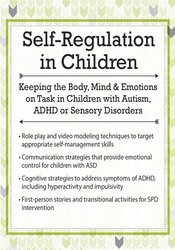

Children with Sensory Processing Disorders, ADHD or autism have much in common. They are challenged with physical problems that affect their ability to focus and can also cause them to be emotionally reactive. Children who have trouble self-regulating throughout the day are missing out on typical childhood experiences in school, on the playground and with their families. They have difficulty making and keeping friends.
This recording looks at the underlying factors of poor self-regulation and how they affect the child. The course emphasizes practical interventions! You will walk away with strategies for creating simple but effective programs in clinical, school and home settings:
Clinical programs such as Interactive Metronome® (IM), brushing, sensory diets, and MeMoves™ will be discussed, as will timely topics such as medication vs. non-medication for ADHD and new insights from research into biomedical aspects of autism.
| File type | File name | Number of pages | |
|---|---|---|---|
| Manual - Self-Regulation in Children (5.4 MB) | 91 Pages | Available after Purchase | |
| Instructions for ASHA credit - Self Study (64.4 KB) | Available after Purchase | ||
| Illinois Educators Self-Study Instructions (15.4 KB) | Available after Purchase | ||
| Illinois Educators Evaluation Form (1.2 MB) | Available after Purchase | ||
| Manual - Self-Regulation in Children - French (5.4 MB) | 91 Pages | Available after Purchase | |
| Manual - Self-Regulation in Children - Italian (5.4 MB) | 91 Pages | Available after Purchase | |
| Manual - Self-Regulation in Children - German (5.4 MB) | 91 Pages | Available after Purchase | |
| Manual - Self-Regulation in Children - Spanish (5.4 MB) | 91 Pages | Available after Purchase |

Gwen Wild, MOT, OTR/L, is an occupational therapist with over 25 years of experience specializing in the treatment of children and adolescents diagnosed with Autism Spectrum Disorder, Sensory Processing Disorders, neurological disorders and a wide variety of developmental disorders in numerous settings. She is the owner of Sensational Brain, LLC, and creator of the popular BrainWorks™ tools, a system for creating effective sensory diets that empowers kids to take charge of their sensory needs.
Gwen is steadfast in helping children learn to self-regulate to manage their behaviors and emotions effectively. She works directly with educators, speech-language pathologists, occupational therapists, BCBAs and other professionals in her roles as an educator, consultant to two school districts and provider of private pediatric occupational therapy services in homes.
Gwen presents worldwide on topics related to sensory modulation and self-regulation teaching practitioners, parents, and teachers who work with children and adolescents practical treatments and interventions. She has been invited to speak at numerous state and local conferences and has been featured on podcasts. Gwen has led and co-authored two research studies on the implementation of sensory strategies for the purpose of enhancing self-regulation, the most recent of which was published in a peer-reviewed journal.
She is an active member of the American Occupational Therapy Association and at the state level, she is a member of the Michigan Occupational Therapy Association.
Speaker Disclosures:
How Self-Regulation Affects a Child’s Physical, Mental and Emotional Wellbeing
Sensory Processing Disorder (SPD)
Create a Sensory Lifestyle
ADHD Strategies
Self-Management Strategies
Utilize Video
iPad® Apps
Autism Strategies
Strategies for First-Person Stories
Making Transitions Uneventful
Calming Strategies
Other Approaches
Please wait ...